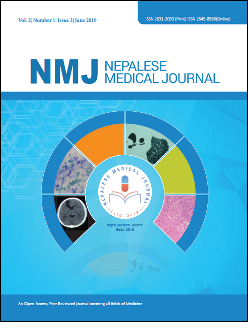An Overview of Comprehensive Abortion Care at Tertiary care Teaching Hospital
DOI:
https://doi.org/10.3126/nmj.v2i1.24051Keywords:
Abortion, comprehensive abortion care, Contraception, ImplantAbstract
Introduction: With the beginning of comprehensive abortion care service in Nepal, since 2004, safe abortion services in the first trimester are available in all 75 district hospitals of Nepal. Nepal has expanded comprehensive abortion care into the second trimester in 2007. This study tries to investigate the reasons for using comprehensive abortion care service and to know the post-abortion contraceptive acceptance among women presenting at first and second trimester of gestation.
Materials and Methods: This hospital-based prospective study was conducted among women seeking comprehensive abortion care service at first and second trimester of gestation in the outpatient department of Obstetrics & Gynaecology, KIST Medical College and Teaching Hospital from July 2017 to July 2018. Data collection was done by filling proforma and was analyzed.
Results: There were a total of 171 clients, out of which 78.95% (n=135) were in the first trimester and 21.05% (n=36) in the second trimester of pregnancy. The reason in the first trimester was completed family (39.25%) and the main reason for the second trimester was maternal mental health (48.71%). Among the total study population, 16.37% (n=28) accepted contraception. The most common accepted contraceptive method was implant (n=14; 8.1%), followed by inj. depot medroxyprogesterone acetate (n=8; 4.6%).
Conclusions: The prevalence of second-trimester abortion is high despite the availability of first-trimester comprehensive abortion care service. The main reason for induced abortion in first trimester was completed family and in second-trimester was maternal mental health. Post-abortion contraceptive acceptance among comprehensive abortion care clients was very low.
Downloads
Downloads
Published
How to Cite
Issue
Section
License
This license enables reusers to distribute, remix, adapt, and build upon the material in any medium or format, so long as attribution is given to the creator. The license allows for commercial use.
Copyright on any article published by Nepalese Medical Journal is retained by the author(s).
Authors grant Nepalese Medical Journal a license to publish the article and identify itself as the original publisher.
Authors also grant any third party the right to use the article freely as long as its integrity is maintained and its original authors, citation details and publisher are identified.




